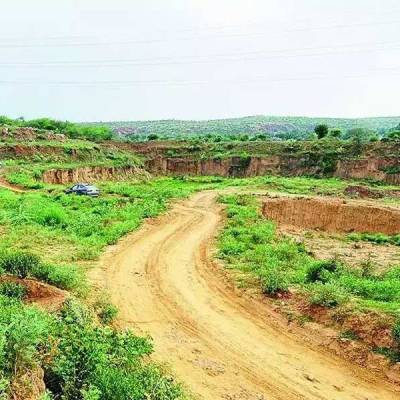

In what seems to be an alarming trend, the Aravali hills are witnessing a surge in illegal farmhouse constructions, resulting in the disappearance of countless trees. These sprawling farmhouses, built without proper authorization, are causing severe damage to the fragile ecosystem of the region.
The Aravali range, covering areas across Northern India, has long been hailed for its rich biodiversity and importance to the local environment. However, the recent illegal construction boom has put this fragile ecosystem at risk. As these farmhouses proliferate, the once-abundant canopy of green is now rapidly depleting.
A significant concern arises from the fact that many of these constructions are occurring in the protected forest zones, where strict regulations exist to preserve the natural surroundings. This blatant disregard for legal restrictions not only leads to environmental degradation but also sets a dangerous precedent for future encroachments.
The absence of trees directly contributes to several ecological issues. Trees play a crucial role in maintaining the balance of oxygen and carbon dioxide, preventing soil erosion, and providing habitats for a diverse range of wildlife. With their disappearance, these functions are disrupted, severely impacting the local flora and fauna.
Moreover, the loss of trees has far-reaching consequences for the climate. Aravali's forest cover used to act as a natural carbon sink, absorbing significant amounts of greenhouse gases. Without these vital trees, the area becomes more vulnerable to the adverse effects of climate change, such as increased temperatures and reduced rainfall.
Efforts to curb this illegal farmhouse construction and tree disappearance are being made. The authorities are working diligently to identify and demolish these unauthorized structures, imposing penalties on the offenders. However, the magnitude of the problem demands a collaborative approach involving stricter enforcement, public awareness campaigns, and community engagement.
Preserving and restoring the Aravali forest cover is crucial not only for its inherent environmental value but also for the well-being and sustainability of the entire region. The impact of illegal farmhouses extends beyond just deforestation; it disrupts the delicate ecological balance, affects water resources, and threatens the livelihoods of local communities.
Recognizing the severity of the situation, it is imperative for the government, local communities, and environmental activists to unite and prioritize the protection of Aravali's trees. Sustainable land-use planning, reinforced legal frameworks, and a collective commitment to conservation can help reverse the damage caused by illegal farmhouse constructions and ensure the revival of the Aravali ecosystem.
Time is of the essence – urgent action is needed to stop the vanishing of trees and preserve the natural heritage of the Aravali hills before irreversible damage is done. It is only through concerted efforts and effective regulation that we can safeguard this invaluable ecosystem for the present and future generations.